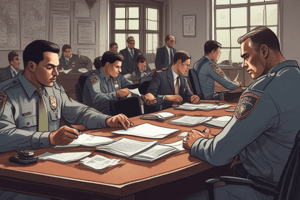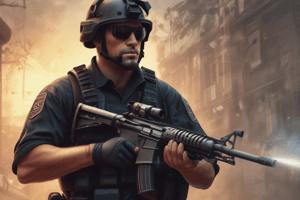Podcast
Questions and Answers
What is primarily emphasized as a crucial skill for law enforcement officers in varying circumstances?
What is primarily emphasized as a crucial skill for law enforcement officers in varying circumstances?
- Strict adherence to law without flexibility
- The ability to move between different roles (correct)
- Physical strength to enforce the law
- Establishing a personal connection with suspects
When is the enforcer role most appropriately utilized according to the content?
When is the enforcer role most appropriately utilized according to the content?
- During all interactions with the community
- At the beginning of every investigation
- When there is a need to maintain order and issue commands (correct)
- Only in high-stress scenarios with potential danger
How can emotional intelligence enhance the performance of a law enforcement officer?
How can emotional intelligence enhance the performance of a law enforcement officer?
- By enabling them to better recognize and manage emotions in themselves and others (correct)
- By influencing them to rely solely on their intuition in chaotic situations
- By promoting a dismissive behavior towards the emotions of the community
- By suppressing their own emotions to appear authoritative
In the context of responding to a sexual battery case, what is a critical first step according to the roles outlined?
In the context of responding to a sexual battery case, what is a critical first step according to the roles outlined?
What can be a potential negative consequence of misusing the enforcer role in law enforcement?
What can be a potential negative consequence of misusing the enforcer role in law enforcement?
What is primarily the role of a law enforcement officer in a community?
What is primarily the role of a law enforcement officer in a community?
Which of the following best describes the focus of the FDLE Professionalism Division's responsibility?
Which of the following best describes the focus of the FDLE Professionalism Division's responsibility?
What type of scenarios do law enforcement officers often handle besides responding to crime calls?
What type of scenarios do law enforcement officers often handle besides responding to crime calls?
How does the Commission ensure the effectiveness of basic recruit training curricula?
How does the Commission ensure the effectiveness of basic recruit training curricula?
What is a primary misconception about the life of a law enforcement officer as portrayed in media?
What is a primary misconception about the life of a law enforcement officer as portrayed in media?
Flashcards
Law Enforcement Officer Roles
Law Enforcement Officer Roles
Law enforcement officers primarily serve the community, assisting individuals and maintaining order, rather than just responding to crime.
Officer's Customer
Officer's Customer
The public is the officer's customer, meaning the main focus is community service and assisting people.
Officer's Responsibilities
Officer's Responsibilities
Officers deal with various tasks, including assisting with emergencies like flat tires, providing crime prevention advice, and educating the public on safety.
Community Service
Community Service
Signup and view all the flashcards
Service-Oriented Profession
Service-Oriented Profession
Signup and view all the flashcards
Stabilizer Role
Stabilizer Role
Signup and view all the flashcards
Enforcer Role
Enforcer Role
Signup and view all the flashcards
Supporter Role
Supporter Role
Signup and view all the flashcards
Emotional Intelligence for Officers
Emotional Intelligence for Officers
Signup and view all the flashcards
Switching Roles
Switching Roles
Signup and view all the flashcards
Study Notes
Officer Training and Roles
- Hundreds of officers, residents, and instructors contributed to officer job analysis and training curricula development.
- The FDLE Professionalism Division ensures officer training remains job-related, valid, and current.
- The Commission annually reviews and revises basic recruit training to prepare graduates for sworn employment with Florida criminal justice agencies.
- Law enforcement is a service-oriented profession, primarily focused on community support, not just responding to crimes.
- Officers play various roles (supporter, stabilizer, enforcer) adapting to situations. Emotional intelligence helps officers switch roles effectively.
- Emotional intelligence involves recognizing and managing one's own and others' emotions, not suppressing them.
- Florida Statutes define a law enforcement officer as elected, appointed, or employed individuals with the authority to bear arms and make arrests, primarily responsible for crime prevention and enforcement.
- The Criminal Justice Standards and Training Commission (CJSTC) oversees certification, training, and conduct of all Florida criminal justice officers.
Training Requirements
- Basic Recruit Training Program requirements include passing end-of-course exams, demonstrating proficiency in DUI stops and high-liability courses, and participating in physical fitness.
- Officer conduct during training is subject to CJSTC standards and penalties for violations.
- Penalties for violations include written reprimands, up to two years of probation (with potential retraining/counseling), suspension (with potential retraining/counseling), or revocation of certification.
- Certification revocation occurs upon felony conviction, guilty plea, or finding of guilt (even with withheld adjudication or sentence suspension). This bars the officer from future Florida law enforcement work.
Criminal Justice System Overview
- Law enforcement officers are crucial components of the criminal justice system.
- Officers who employ procedural justice during encounters with the public (e.g., noise complaints) explain actions, offer explanations, and maintain respect.
- Procedural justice leads to a positive public perception of law enforcement and reduces crime.
- Officer legitimacy (viewed as fair, morally obligated, legitimate) strongly correlates with crime reduction and public trust. Reduced public trust results in less crime reporting.
- Public trust and respect between officers and citizens are vital for a safer environment.
Ethical Conduct
- Ethical standards are essential in law enforcement to maintain community trust and career integrity.
- Unethical behaviors damage relationships with the public and harm an officer's career.
- The Law Enforcement Oath of Honor emphasizes integrity, accountability, upholding the Constitution, and serving the community.
- Officers must prioritize maintaining trust and adhering to ethical guidelines.
Studying That Suits You
Use AI to generate personalized quizzes and flashcards to suit your learning preferences.




